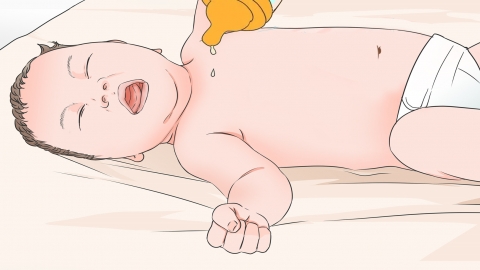What should I do if a nine-month-old baby has diarrhea due to enteritis?
Diarrhea refers to diarrhea. Diarrhea caused by enteritis in a 9-month-old baby may be triggered by inappropriate diet, formula transition or intolerance, abdominal cold exposure, intestinal flora imbalance, acute gastroenteritis, and other factors. Management should be based on the specific situation, and parents should promptly take the baby to the hospital for examination to determine the cause and appropriate treatment.

1. Inappropriate diet: A baby's gastrointestinal system is relatively sensitive and may react adversely to certain food components, causing intestinal inflammation and diarrhea. Adjust the baby's diet to avoid allergenic or intolerant foods and provide bland, easily digestible foods such as millet porridge or pumpkin porridge.
2. Formula transition or intolerance: If the baby transitions from breast milk to formula or is intolerant to certain formula components, diarrhea may occur. Consider switching to formulas suitable for the infant's digestive system, such as partially hydrolyzed protein formulas or lactose-free formulas.
3. Abdominal cold exposure: Babies have relatively weak temperature regulation abilities; if the abdomen gets chilled, it may cause increased gastrointestinal motility and lead to diarrhea. Pay attention to keeping the baby's abdomen warm, adjust clothing according to weather changes, and apply warm compresses using a warm towel or hot water bottle to relieve symptoms.
4. Intestinal flora imbalance: During the early period after birth, the baby's intestinal flora has not yet fully developed. External factors may cause imbalance in the intestinal flora, leading to diarrhea, which may be accompanied by symptoms such as bloating, abdominal pain, alternating constipation and diarrhea. It is recommended to use medications such as Bifidobacterium and Lactobacillus bifidus live granules, Bifidobacterium capsules, or triple live bacterial capsules containing Bifidobacterium under a doctor's guidance.
5. Acute gastroenteritis: Babies may develop acute gastroenteritis due to viral or bacterial infections, causing diarrhea accompanied by nausea, vomiting, abdominal pain, fever, and other symptoms. It is recommended to use medications such as Cefixime granules, Bismuth Potassium Citrate tablets, and Compound Berberine tablets under medical supervision to alleviate discomfort.
During treatment, parents should also pay attention to daily care and dietary adjustments for the baby. Maintain hand hygiene to prevent ingestion of pathogens. Ensure proper abdominal warmth to avoid cold exposure.





